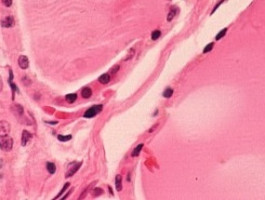
A panel of four blood biomarkers, comprised of the known pancreatic cancer biomarker CA 19-9 and three new biomarkers, successfully distinguished individuals with pancreatic cancer from individuals who were healthy, had chronic pancreatitis, or had pancreatic cysts approximately 90 percent of the time, according to results presented at the AACR special conference on Pancreatic Cancer: Innovations in Research and Treatment.
The four blood biomarkers together correctly identified 92 percent, 85 percent, and 92 percent of samples as having come from patients with pancreatic cancer when compared with samples from healthy individuals, patients with chronic pancreatitis, and patients with pancreatic cysts, respectively.
The panel also correctly identified as negative for pancreatic cancer, 94 percent, 90 percent, and 91 percent of samples from healthy individuals, patients with chronic pancreatitis, and patients with pancreatic cysts, respectively.
“Our biomarker panel was much better at distinguishing patients with pancreatic cancer from those who were healthy, had chronic pancreatitis, or had pancreatic cysts compared with CA 19- 9 alone,” said Ayumu Taguchi, Ph.D., M.D., assistant professor at The University of Texas MD Anderson Cancer Center in Houston.
“This means that our panel has the potential to substantially reduce the number of patients who would have to undergo extremely invasive screening procedures.”
According to Taguchi, only about 10 percent of patients with pancreatic cancer are diagnosed when the disease is localised, a situation that improves outcomes.
Moreover, current imaging techniques for pancreatic cancer detection are not amenable to widespread screening programs and the CA 19-9 blood-based biomarker is not sufficiently reliable to be used broadly, he added.
Taguchi and colleagues analysed levels of CA 19-9 and 20 other potential biomarkers in blood samples from 98 patients with pancreatic cancer, 50 healthy individuals, and 29 patients with chronic pancreatitis.
This initial analysis allowed them to determine the best combination of potential biomarkers for further study.
The four-biomarker panel was validated using blood samples from two independent cohorts: One consisted of 42 patients with early-stage pancreatic cancer, 50 healthy individuals, and 50 patients with chronic pancreatitis and the other consisted of 22 patients with early-stage pancreatic cancer and 14 patients with benign pancreatic cysts.
In these analyses, CA 19-9 alone correctly identified as negative for pancreatic cancer blood samples from 78 percent, 78 percent, and 76 percent of healthy individuals, patients with chronic pancreatitis, and patients with pancreatic cysts, compared with 94 percent, 90 percent, and 91 percent for the four-biomarker panel, respectively.
“We need to further validate our panel using larger numbers of samples collected before diagnosis of early-stage pancreatic cancers,” said Taguchi.
“However, we are hopeful that we can develop a panel that will have clinical application.”
Source: AACR
We are an independent charity and are not backed by a large company or society. We raise every penny ourselves to improve the standards of cancer care through education. You can help us continue our work to address inequalities in cancer care by making a donation.
Any donation, however small, contributes directly towards the costs of creating and sharing free oncology education.
Together we can get better outcomes for patients by tackling global inequalities in access to the results of cancer research.
Thank you for your support.